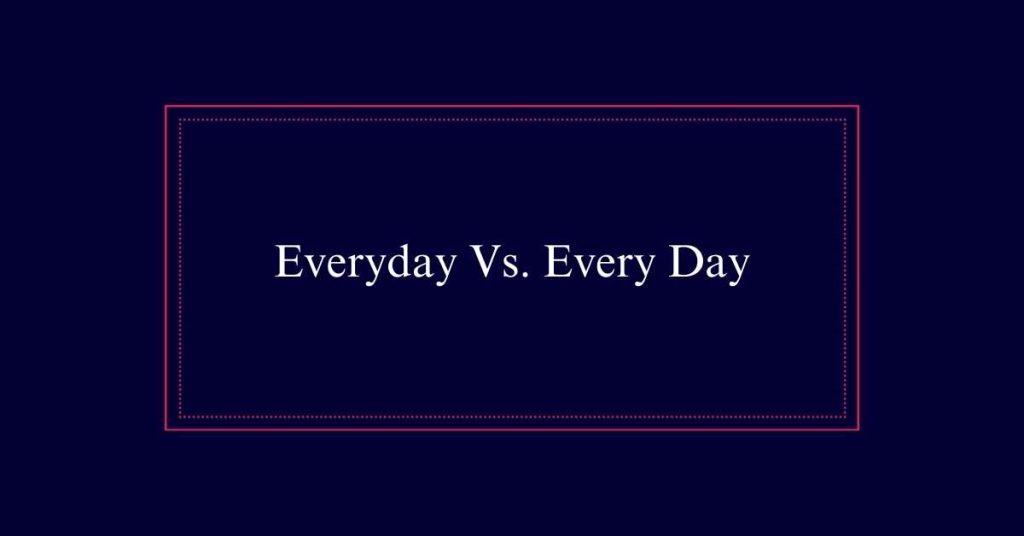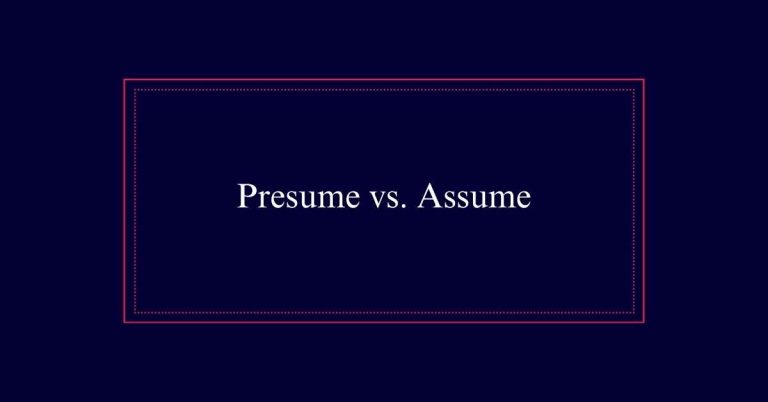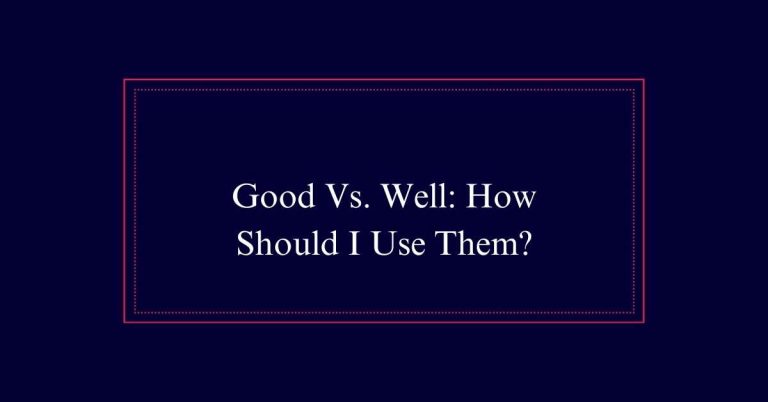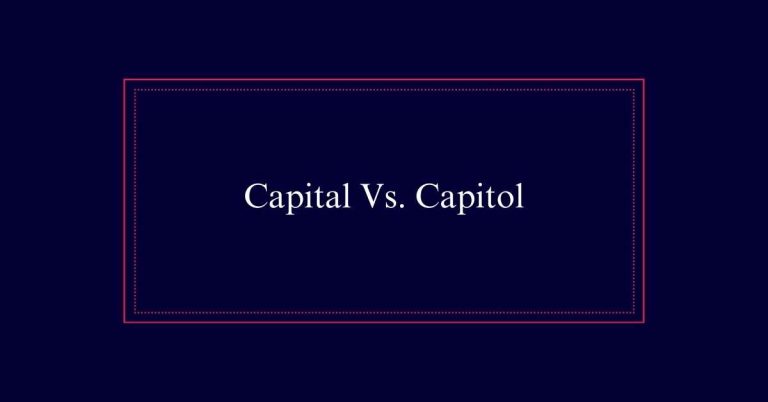Everyday Vs. Every Day
‘Everyday’ is an adjective describing routine or common items, like in ‘everyday clothing.’ It highlights the ordinary nature of things used frequently. In contrast, ‘every day’ is an adverbial phrase that refers to something occurring daily, such as in ‘I exercise every day.’ The nuance lies in context: ‘everyday’ emphasizes ordinariness, while ‘every day’ emphasizes the repetition of actions.
Understanding Everyday
Understanding the term ‘everyday’ involves recognizing it as an adjective that describes common, routine, or ordinary items and occurrences. This term is synonymous with words like average, mundane, ordinary, and standard.
For example, when referring to clothing, ‘everyday’ signifies regular outfits worn in typical, non-special situations. Additionally, ‘everyday’ can sometimes function as a noun, denoting daily routines or activities. It is important to understand that ‘everyday’ specifically highlights the ordinary nature of things.
Misuse of this term can lead to confusion, especially when distinguishing it from ‘every day,’ which indicates something happening each day. Proper usage of ‘everyday’ ensures clear communication about the commonplace or habitual aspects of life.
Defining Every Day
The phrase ‘every day’ refers to something occurring on a daily basis, emphasizing the regularity of the event. It is composed of the adjective ‘every,’ which modifies the noun ‘day,’ together meaning each day individually.
This phrase is used to highlight the frequency of an action or occurrence, underscoring that it happens consistently without exception. For instance, ‘She goes for a walk every day’ indicates a daily routine.
Unlike ‘everyday,’ which functions as an adjective to describe something common or typical, ‘every day’ focuses on the repetition of the action.
Everyday Synonyms
Synonyms for ‘everyday’ include average, mundane, ordinary, and standard. These words share the connotation of being routine and commonplace, emphasizing the lack of novelty or exceptionality. They are particularly useful in describing things that are part of our daily lives, and often go unnoticed due to their familiarity.
Consider the following sentiments when reflecting on the word ‘everyday’:
- The comfort of routine: Finding solace in the predictable.
- The beauty of simplicity: Appreciating the little things.
- The challenge of monotony: Endeavoring to find excitement in the usual.
- The essence of normalcy: Valuing stability and steadiness.
Examples of Everyday
Examples of ‘everyday’ highlight its use as an adjective describing common, routine, or typical aspects of life.
For instance, in the phrase ‘everyday clothing,’ it refers to regular outfits that one wears on a normal basis, as opposed to special occasion attire.
Similarly, ‘everyday problems’ denotes routine challenges that people commonly face, such as traffic or household chores.
Another example is ‘everyday language,’ which signifies the ordinary speech used in casual conversations, as opposed to formal or technical language.

In marketing, ‘everyday low prices’ communicates the idea of consistently affordable pricing.
Examples of Every Day
People perform various tasks every day, such as brushing their teeth, commuting to work, and preparing meals. These daily activities are integral to our routines and help maintain a sense of normalcy and organization.
Here are a few examples of tasks people might engage in every day:
- Waking up to the comforting sound of an alarm clock: It signals the start of a new day, full of potential and opportunities.
- Enjoying a cup of morning coffee: This simple pleasure often sets the tone for a productive day.
- Connecting with loved ones through a phone call or text: These small interactions strengthen relationships and provide emotional support.
- Reflecting on the day’s accomplishments before bed: This practice can foster a sense of achievement and peace.
Common Confusions
Understanding the difference between ‘everyday’ and ‘every day’ is essential for clear and effective communication, especially when describing routines and habits. Common confusions arise because both terms sound identical but serve different grammatical functions.
‘Everyday’ is an adjective meaning commonplace or routine, used to describe ordinary items or occurrences. Conversely, ‘every day’ is a phrase that means each day, emphasizing the frequency of an action. Misusing these terms can lead to ambiguity.
For instance, saying ‘I wear everyday clothes’ implies wearing normal, routine outfits, while ‘I wear clothes every day’ specifies the daily action of wearing clothes. Recognizing their distinct roles in language helps in conveying precise and clear messages.
Usage Tips
To guarantee clarity in writing, always remember that ‘everyday’ is used to describe ordinary items, while ‘every day’ refers to something that happens each day. Proper usage enhances readability and avoids confusion.
Here are some tips to keep in mind:
- Avoid Miscommunication: Make sure your audience understands the difference.
- Enhance Professionalism: Correct usage reflects attention to detail.
- Boost Engagement: Clear writing captivates and retains readers.
- Promote Consistency: Consistent use builds credibility and trust.
Key Differences
The key differences between ‘everyday’ and ‘every day’ lie in their grammatical roles and meanings. ‘Everyday’ functions as an adjective, used to describe something ordinary or typical, such as in ‘everyday clothing,’ which refers to regular outfits. It can also sometimes act as a noun to denote daily routines.
In contrast, ‘every day’ is a phrase where ‘every’ is an adjective modifying the noun ‘day,’ meaning each day. For example, ‘People do it across the globe every day.’ This phrase emphasizes the frequency of an action occurring daily.
Understanding these distinctions is important for precise communication, ensuring that ‘everyday’ describes regular items, while ‘every day’ highlights daily occurrences.
Frequently Asked Questions
Can Everyday Be Used at the Start of a Sentence?
Yes, ‘everyday’ can start a sentence when used as an adjective. For instance, ‘Daily tasks can become monotonous.’ Make sure it fits grammatically within the sentence structure and accurately describes the subject.
Is There an Adverb Form of Everyday?
There is no adverb form of “everyday.” The term “everyday” functions solely as an adjective. If you need an adverbial equivalent, consider using phrases such as “daily” or “every day” to convey frequency.
How Do Translations Handle Everyday Vs. Every Day?
Translations often guarantee ‘everyday’ and ‘every day’ by using context-specific words to convey their distinct meanings. Languages with separate terms for adjectives and phrases secure clarity, maintaining the difference between routine and daily occurrence.
Are There Idiomatic Expressions Using Everyday or Every Day?
Yes, idiomatic expressions exist using these terms. Examples include “an everyday hero,” which refers to an ordinary person performing extraordinary tasks, and “every day is a new day,” emphasizing the potential for fresh opportunities daily.
Can ‘Everyday’ and ‘Every Day’ Be Used in Formal Writing?
Yes, both ‘everyday’ and ‘every day’ can be used in formal writing. ‘Everyday’ serves as an adjective for routine items or situations, while ‘every day’ emphasizes daily frequency or occurrence. Proper usage guarantees clarity.






